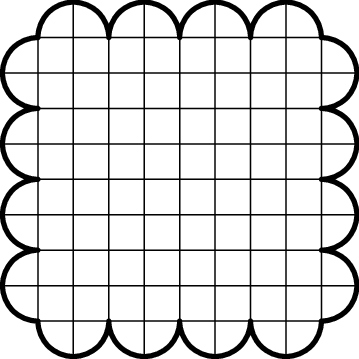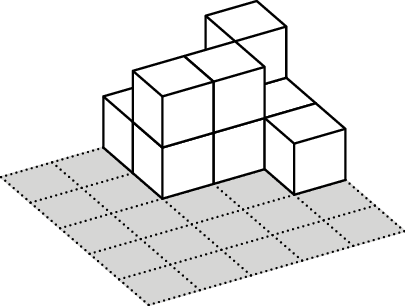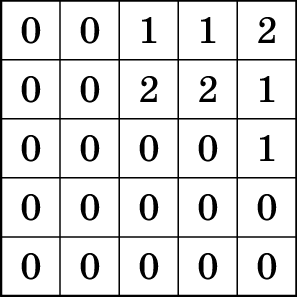Problems
Decipher the quote from "Alice in Wonderland" from the following
matrix:
\[\begin{array}{@{}*{26}{c}@{}}
Y&q&o&l&u&e&c&d&a&i&n \\
w&a&r&l&a&w&e&a&t&y&k \\
s&n&t&c&a&e&k&c&e&a&m \\
t&o&d&r&w&e&a&t&a&h&r \\
a&c&n&t&n&e&o&d&t&r&h \\
n&i&d&n&l&g&m&e&x&s&z
\end{array}\]
Decipher the following quote from Alice in Wonderland:
Lw zrxog eh vr qlfh li vrphwklqj pdgh vhqvh iru d fkdqjh.
The same letters correspond to the same in the phrase, different letters
correspond to different. We know that no original letters stayed in
place, meaning that in places of e,r,h there was surely something
else.
Elon is studying the Twitter server. Inside the software he found two integer variables \(a\) and \(b\) which change their values when special search queries “RED”, “GREEN”, and “BLUE” are processed. More precisely the pair \((a, b)\) changes into \((a + 18b, 18a - b)\) when processing the query “RED”, to \((17a + 6b, -6a + 17b)\) when processing “GREEN”, and to \((-10a - 15b, 15a - 10b)\) when processing “BLUE”. When any of \(a\) or \(b\) reaches a multiple of \(324\), it resets to \(0\). If \((a, b) = (0, 0)\) the server crashes. On the server startup, the variables \((a, b)\) are set to \((20, 20)\). Prove that the server will never crash with these initial values, regardless of the search queries processed.
After mastering the Caesar shift cypher one may wonder how to generalize it. One possible way is to use Affine cypher. The difference between these two methods can be described as follows:
In case of Caesar cypher we took a letter with position \(n\) from \(1\) to \(26\) and added to its position a number \(d\) obtaining the number \(n+d\), then we compute its residue modulo \(26\).
In case of affine cypher we take a letter with position \(n\) and consider a number \(nx + d\) modulo \(26\).
To decipher such code we need to know values \(x\) and \(d\), then if we have a letter in the code with position \(m\), we can find \(n\) as \(n= (m-d)x^{-1}\) modulo \(26\). Here we have to explain what is \(x^{-1}\): for a number \(x < 26\) we are looking for such a number \(y\), that \(26\) divides \(xy-1\).
Does there always exist a number \(x^{-1}\) modulo \(26\) for any \(x\)?
Using data \(x=3\), \(d=8\) encrypt the word "SOLUTION".
Two expressions are written on the board:
\[1 + 22 + 333 + 4444 + 55555 + 666666 +7777777 + 88888888 + 999999999\] \[9 + 98 + 987 + 9876 + 98765 + 987654 + 9876543 + 98765432 + 987654321\]
Determine which one is greater or whether the numbers are equal.
Cut the "biscuit" into 16 congruent pieces. The sections are not
necessarily rectilinear.

Bryn calls the date beautiful if all \(6\) digits of the date entry are different. For example: 19.04.23 is a beautiful date, but 19.02.23 and 01.06.23 are not. How many beautiful dates are there in \(2023\)?
In the middle of an empty pool there is a square platform of \(50 \times 50\) cm, split into cells of \(10\times 10\) cm. Sunny builds towers of \(10\times 10\times 10\)cm cubes on the platform cells. After that his friend Margo turns on the water and counts how many towers are still above the water level. They call each visible tower an island.
For example, let’s consider the case when the heights of the towers
are as given in the table on the right. Then at the water level of \(5\) cm there is \(1\) island, at the water level of \(15\) cm there are two islands (if the
islands have a common corner or don’t intersect at all, they are
considered separate islands), and at the water level of \(25\) cm, all the towers are covered with
water and there are \(0\)
islands.


Find out how Sunny should build his towers to get the following numbers
of islands corresponding to the level of water in the pool: \[\begin{array}{@{}*{26}{c}@{}}
\textit{Water level (cm)}& 5& 15& 25& 35& 45\\
\textit{Number of islands}& 2& 5& 2& 5& 0
\end{array}\]
In the solution, write down how many cubes are there composing a tower in each cell as it is done in the example.
On the grid paper, Theresa drew a rectangle \(199 \times 991\) with all sides on the grid lines and vertices on intersection of grid lines. How many cells of the grid paper are crossed by a diagonal of this rectangle?
The school cafeteria offers three varieties of pancakes and five different toppings. How many different pancakes with toppings can Emmanuel order? He has to have exactly one topping on each pancake.